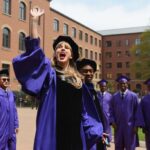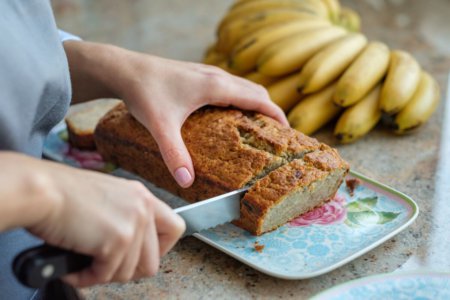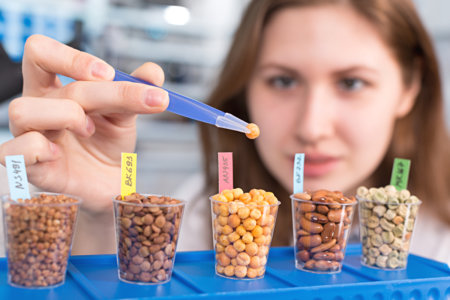
A “kuih” is a bite-sized Malaysian snack that’s ubiquitous during breakfast and tea time in the Southeast Asian country where Loo Yee Wong, grew up.
It can be filled with curried potatoes, propped up on a base of glutinous rice or cocooned in fresh coconut shreds — whatever form it takes (and there are many), each is painstakingly made.
To Wong, none takes greater care and time than the “kuih lapis” — which translates loosely to “layer cake.”
“It takes a lot of effort to make because you have to steam it layer by layer, which requires patience and time, just like my dietetics degree and all the requirements it takes to become a registered dietitian,” says Wong.
The layer cake or “kuih” is not your typical introduction to a story about a dietetics degree.
The modern definition of dietetics is the “integration and application of principles derived from the disciplines of food, nutrition, management, communication, biological, physiological, behavioural and social sciences to achieve and maintain human health.”
The layer cake or kuih isn’t the lowest-calorie item on the menu in Malaysia but as Wong would discover, the study of dietetics isn’t confined to mere calorie-counting either.
It was so much more than that.
Dietetics degree: “A mode of life”
The word “diet” has its origins in the Latin “diaeta” which means “mode of life.”
As a Malaysian student abroad in the US, food did become a way of life, something familiar she could always turn to, especially when you’re away from home halfway across the globe and feeling homesick.
For Wong, baking was the outlet she found to overcome that, making egg tarts, cream puffs, pineapple buns, and more.
“I realised that food from home is hard to obtain in Iowa, so I gradually started baking things I missed,” she shares.

Wong had the opportunity to join a community engagement programme as part of her internship rotation in Ghana. Source: Loo Yee Wong
How a dietetics degree opened up her world
When choosing a dietetics degree, Wong set her mind on finding a university that would help her develop her future career.
She ended up choosing Iowa State University’s reputable dietetics programme, a fateful decision that would later lead her to find her calling.
As part of her dietetic degree, she got to offer nutrition counselling in the neighbouring state of Nebraska and even joined a month-long community engagement trip in Ghana.
“My Ghana rotation during my internship was very eye-opening. I got to experience a new country and learn about the culture while performing nutrition-related care processes and educating the community about basic nutrition,” she says.
A foodie herself, trying authentic Ghanaian food for the first time was memorable too.
Unused to the cuisine and because the food hygiene in the area wasn’t the same as the US standards that she had gotten used to, Wong recalls having an upset stomach for a whole week during her internship.
“But I’ve grown to like certain Ghanaian food from that experience and still think about having it from time to time,” she says.
“And professionally, it has strengthened my knowledge and understanding of the healthcare systems from a global perspective too.”

Wong chose to pursue both her Bachelor’s in Dietetics and Master’s in Nutritional Science at Iowa State University. Source: Loo Yee Wong
After earning a dietetics degree, Wong looked into pursuing a Master’s in Nutritional Science and found it right at Iowa State University.
The university’s research excellence was the main reason she chose to stay here, among many others.
Studying in the same university has advantages, especially when you’re an international student looking to gain more experience.
Getting an internship or a job in the US often requires you to have US citizenship, something foreign students don’t possess.
And in 2017, Wong was one of the 290,836 international students in the US, and one of the 8,247 Malaysians.
Not only did she need to compete with locals, but with other international students for job opportunities too.
“This reduces our range of opportunities despite all the potential in the job market,” says Wong. “We have to work harder than anyone else to stand out from the hundreds of our peers just to secure some form of experience.”
Studying for her master’s at Iowa State University gave her access to their network, connected her with faculty, and increased her chances of landing assistantship offers.
Wong would later get a position as a graduate teaching assistant and graduate research assistant at the university.
During her postgraduate studies, she successfully published two research articles – one being “A cross-sectional assessment of food practices, physical activity levels, and stress levels in middle age and older adults’ during the COVID-19 pandemic.”
Wong cites them as significant milestones in her life — the result of her curiosity and passion for dietetics and nutrition which started long before university.
All roads lead to food
At six years old, Wong joined her first ballet dance class.
Growing up in studios meant being surrounded by the stigma that ballet dancers were meant to be just skin and bones.
While Wong was lucky enough to avoid eating disorders, she recalls her teachers telling the class to be mindful of their meals, especially during the times leading up to an exam or performance.
“Sometimes, I would feel guilty eating too much or when some meals turn out to be heavier, though I do think that what you eat and how you feel from eating affects the performance,” she shares.
This was what sparked her interest in pursuing her dietetics degree. There must be more to nutrition than just eating fruits and vegetables every day, she felt.
Now working as a clinical dietitian in a non-profit organisation-based hospital in Florida, Wong plays an essential role in counselling and conducting nutritional assessments for patients and the local communities.
She leads nutrition classes and discussions in the hospital’s cancer support group committee too.
“I realised that there is so much misinformation about nutrition that can be damaging to others,” she says.
With her accumulated experiences from university, Wong navigates her work with little trouble.
As an international student, she was no stranger to understanding many perspectives adapting to new environments and refining her communication skills.
As Wong speaks Mandarin, Cantonese, English, and Malay, these gave her another leg-up in her hospital role.
There was one skill that she said she only got to improve later in a work setting: critical thinking.
“After entering the real world, there were a lot of situations that required decision-making and problem-solving. The ability to think critically and make the right decisions at work is crucial,” she shares.
“Interacting with patients in the hospital and providing them with the best interventions and care plan requires those skills to help patients improve and recover from illness. These are skills you learn after entering the workforce and improve upon experiences.”
Wong’s experience working in healthcare has further solidified her desire to work towards being a registered dietitian.
“I see the need to better people’s health and work towards creating a better lifestyle by communicating accurate nutrition and health information.”
It’s a worthy goal, especially for someone who has always been on the fast track of her education.
Having graduated high school at 16, Wong completed her dietetics degree at 20 and earned her master’s degree at 23.
“I think age is just a number, and graduating at a young age does not mean I am better than anyone else. I often compared myself with my peers, but I learned that doing so brings more harm than good,” she says.
“An advice that I often remind myself is to compare myself with who I was before. Entering the workforce at a relatively young age may seem impressive, but at the end of the day, I am just another individual trying to live my life.”

A self-proclaimed foodie, Wong enjoys travelling and discovering new food wherever she goes. Source: Loo Yee Wong
The future is cooking
Her advice for those looking to study abroad? Take every difficulty as an opportunity to learn.
“Don’t be afraid when a challenge comes up because that’s how you really grow. At the end of the day, everything will work out perfectly fine, just the way it was meant to be,” she says.
“A patient once asked me if I was old enough to work in the hospital, but with my knowledge, skills, and experiences, I can confidently say that I am capable of doing what I do best as a dietitian and giving the best care for my patients. It does not have to take into account how old I am.
And while the world is her oyster, one that she has explored and is still not done with, Wong will always make room for her Malaysian roots.

Wong, pictured with friends for Iowa State University’s Malaysian Cultural Night. Source: Loo Yee Wong
Between joining Iowa State University’s Malaysian Cultural Night events, she’s fostered a community of friends who were more than happy to indulge in her baking and weekly feasts hosted at her apartment.
“Having a community of people from the same country makes you feel like you’re home even when you’re not, and I think I’m really lucky to have a good group of friends that bonded well and lived close to each other.”
“Back then, we would have weekly ‘feed the village’ sessions where we came together and prepared a feast with a different theme each time. I even prepared bibimbap for 15 of my friends once.”
This was the time that Wong’s baking kicked off too.
In 2020, she started @looloo.eats on Instagram to share her creations and her love for baking.
View this post on Instagram
Since then, she’s built a steady following, even getting opportunities to collaborate with brands and hosting the occasional sale of Asian snacks during festivities.
“I think it aligns really well with my current profession as a dietitian. I hope to slowly build this passion and love for baking further – maybe opening a bakery someday, who knows!” she says.
“I am still trying to figure out what I want to do in the long run. I just know that I want to continue helping people as a dietitian and spreading the love of baking to everyone.”
Whatever is in store for her future, Wong firmly believes that success isn’t measured by how quickly something is achieved.
“I think that the journey that matters most, and I’m really excited for what’s to come,” she says.










